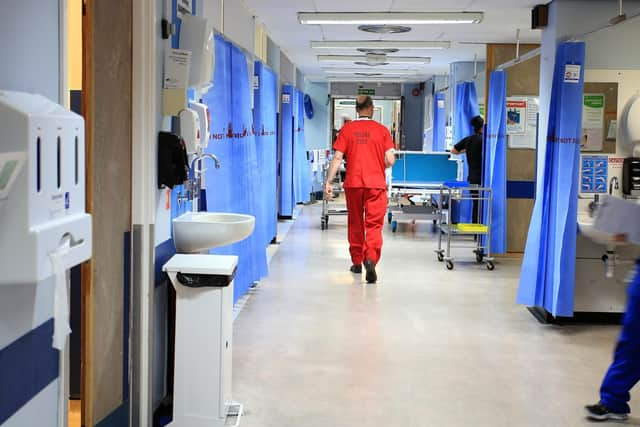Treatment waiting times at record high at Preston and Chorley hospitals
and live on Freeview channel 276
The King's Fund think tank warns the “body blow” inflicted to NHS services by Covid-19 means patients could face long waits for months or even years to come.
Patients referred for non-urgent consultant-led elective care should start treatment within 18 weeks, according to NHS rules.
Advertisement
Hide AdAdvertisement
Hide AdBut NHS data shows 18,100 patients on the waiting list for elective operations or treatment at Lancashire Teaching Hospitals NHS Foundation Trust at the end of June had been waiting longer.


That was 52 per cent of those on the list, up from just 20 per cent the previous June and the highest rate for the month since 2011, the earliest year for which data was available. Of those who were delayed, 763 had been waiting more than a year.
NHS trusts are normally expected to make sure no more than eight per cent of patients are left waiting beyond the 18 week maximum target.
But the thousands of procedures cancelled to free up hospitals during the coronavirus pandemic has created a huge backlog across England.
Advertisement
Hide AdAdvertisement
Hide AdFaith Button, chief operating officer at Lancashire Teaching Hospitals NHS Foundation Trust, said: “Clearly Covid-19 has had a significant impact on the way we manage our hospitals and we have had to make a lot of changes to ensure that we can treat patients as safely as possible whilst being able to keep Covid and non-Covid patients separate.
"We are a large Trust providing a wide range of specialist services to a population of 1.5m people across Lancashire and South Cumbria so some of our waiting lists may be longer due to the volume of people and the wide geography that we cover. We want to do everything that we can to address this and are very grateful for the support of our communities.
“Although there is a local outbreak of coronavirus in the community in Preston, the numbers of Covid positive patients in our hospitals has been steadily decreasing in recent weeks. This means that we have now been able to reinstate a number of procedures that were stood down at the start of the pandemic as well as some outpatient appointments.
"We have also received some funding to help us remodel our surgical theatres to ensure that we can carry out procedures on Covid and non-Covid patients separately and reduce the chances of a patient’s treatment being delayed.
Advertisement
Hide AdAdvertisement
Hide Ad"We are also in discussions with other trusts to look at how we are going to work together to make sure our patients get the best possible services which may involve going to other hospitals rather than their nearest one depending on their needs.”
Nationally, 1.9m people were still waiting for treatment after 18 weeks in June – the most for any month since records began in 2007.
At 48 per cent of those on the waiting list, it was also the worst performance on record.
More than 50,000 had been on the list for more than a year, compared to around 1,000 a year earlier.
Advertisement
Hide AdAdvertisement
Hide AdGbemi Babalola, senior analyst at the King’s Fund, said the virus has “dealt a body blow to NHS and social care services”.
“The sheer scale of pent up demand for healthcare services, and the ongoing challenges facing staff during the pandemic mean there is a long and difficult road ahead,” she added.
“Health and care leaders are already bracing for an intense winter spike in demand, and patients should expect long waits for care to continue for many months and maybe years to come.”
Boris Johnson recently announced NHS trusts across England will receive £300 million to upgrade facilities ahead of the winter amid fears of a second wave of the coronavirus.
Advertisement
Hide AdAdvertisement
Hide AdThe Prime Minister said the additional cash would enable hospitals to maintain essential services and reduce the risk of Covid-19 infection during the coming months.
The funding comes from a £1.5bn capital building allocation for the NHS set out by Mr Johnson in June.
But Dr Nick Scriven, former president of the Society for Acute Medicine, said it would “take more than a token cash injection announced by the Prime Minister this week to make up for years of neglect”.
An NHS spokesman said: "Now that the NHS has managed the first wave of coronavirus, there is an important job to do to help people whose planned care was postponed to protect their own safety, and that’s exactly what local health services are doing, while also remaining ready for any future increase in Covid cases.”